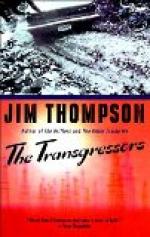“The work that I shall outline to you after hearing your stories, will require stout hearts to carry it into execution.
“It cannot be accomplished by fanatics. It requires the concerted efforts of men of sound judgment; men of courage. The assassin is a coward at heart—the political martyr must be valiant.”
The novelty of the suggestion that has just been made is the first thing that appeals to the minds of the committee. They begin to realize the horrid character of the proposition. Much discussion follows. Men want to know what Nevins means by a Syndicate of Annihilation. Whom does he intend to murder? Annihilation and murder are considered synonymous.
To all questions Nevins replies that the details will be given as soon as the men recite their grievances.
Professor Talbot and Hendrick Stahl, the two men who are in the secret with Nevins, advise the members of the committee to comply with the demands.
Then begins the strange, startling recital of the stories of human distress. Of the forty men of varying professions and trades, there are those who tell of their efforts to stand up under the weight of the yoke of commercial despotism. Each man is of impressing character and strong individuality.
The chairman, Albert Chadwick, is the first to tell his story. It is the prelude to the concerted cry of the oppressed—the cry which has sounded through the ages as the one never varying note in the music of the universe; the dread inharmonic monotone that marks the limitation of humanity, exhibiting man’s inability to convert the world into a paradise.
CHAPTER IX.
Arraignment of the transgressors.
Standing upon the little platform which serves as a rostrum, Chadwick, a man of fifty, seared and bent, lifts his hand to command the attention of the committee.
He is a figure that would do credit to the brush of a great artist. His appearance is that of a man who has been deprived of the power of looking at the world as a place of rest; he is a bundle of nerves, and at the slightest provocation bursts into a storm of irascibility. A tortured spirit lurks in his soul and is visible in his stern, tense features.
As he begins the recital of his grievances against the Trust, it is apparent that he means to give the audience an embittered story. So the attention of all is centered upon him.
“Human liberty is the boon which man has sought since the dawn of creation; it has furnished the incentive for his struggle to reclaim the earth from the domination of brute force; it is the inherent idea that the founders of this Republic sought to embody in the Constitution. But Liberty must have as a complement unhampered opportunity,” are his opening words.
“The man who is dependent upon another for his livelihood is not capable of enjoying real liberty, or of attaining happiness. When the men of a nation are debased to a position of minor importance, where they can only act as servants, they lose the stamina necessary to make them good citizens. This condition now prevails in the United States.




